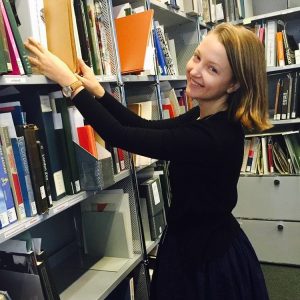
This is a post by Saskia Kusnecov, who worked at the Margery Somers Foster Center while an undergraduate student at Rutgers University.
I learned of the opportunity to work on the Douglass Alumnae Oral History Project in my sophomore year in Douglass Residential College. At the first call for part-time transcribers, I leapt. As a history major and a lover of stories, I relished the opportunity to listen and document the narratives of Douglass alumnae.
From a technical perspective, the goal of this project was to digitize the cassette tape interviews with Douglass alumnae, so that they could be archived online and made accessible to the public. Part of this endeavor is creating written transcriptions for the interviews, which was my charge. I would listen along to the interviews, most of them hours long, and transcribe their conversations. While monotonous to most, I rejoiced in being able to listen along to the life stories of the incredible women who came before me.
These stories, housed on cassette tape, were of women who were some of the first in their families to attend college; women who had lived through the great wars, and saw society transform around them, in real time. I learned of the traditions that were kept at my very dormitory, in its earliest days, and was rocked by stories of discrimination in a building just twenty paces from mine. I was afforded the opportunity to present on my experience working with these interviews at the Women’s History in the Digital World Conference at Bryn Mawr College in 2014, and speak about my newfound belief that one of the most powerful tools we have for social change and cultivating a sense of common humanity is our own personal narratives.
After leaving the Douglass Alumnae Oral History Project, I carried this conviction with me into everything I did. I recorded an oral history interview with my grandmother, a World War II survivor, and facilitated an interview for the Rutgers Oral History Archives (ROHA) with Ana Soto-Canino, a local artist and business owner. I wrote and presented on the intersections of storytelling and identity for the Institute for Women’s Leadership, and digitized dozens of Rutgers alumni interviews for the ROHA before deciding, ultimately, to pursue a Masters in Library and Information Science, so that I could devote my life to making these materials available to the public.
I am now in my first full-time position at Fairleigh Dickinson University in Madison, where I serve as the Research and Metadata Librarian, managing the university’s digital projects and teaching information literacy skills to students. Working on the Douglass Alumnae Oral History Project was not only my first exposure to the library profession, but it was also the seed of my lifelong interest in public history, the power of storytelling, and the importance of making information freely available to the public. I will always to grateful to the Margery Somers Foster Center and the women who gave their stories, for giving mine.